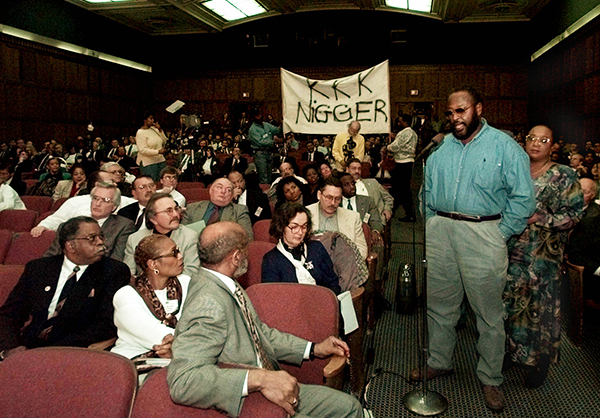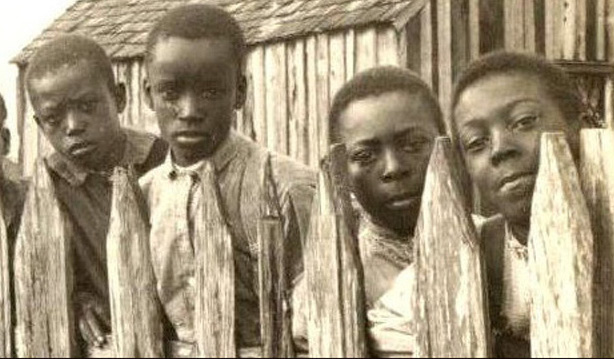As Judge Blocks Law to Redress Discrimination Against Black Farmers...
You Need to Know This History
| revcom.us
On June 23 a federal judge in Florida issued a nationwide injunction temporarily blocking debt relief payments intended for Black and other minority farmers. The payments are part of a larger “American Rescue Plan” for coronavirus pandemic relief that became federal law in March.
According to a report in the Atlanta Journal Constitution, during the first phase of the coronavirus relief program last year, 95 percent of the government funds spent to buy meat, dairy, and produce for food boxes to families in need ended up going to white farmers—$6 billion in total.1 But white farmers in several states filed suits against the debt relief payments to Black farmers, claiming they (the white people) were ineligible for the relief “because they’re white,” and that the payments violate their constitutional rights.2
Former officials in the Trump/Pence regime and other fascists are deeply involved in these lawsuits. For instance, in Texas, Stephen Miller, one of Trump’s closest advisors, helped form the “America First Legal Foundation,” which is suing on behalf of Sid Miller (no relation), a white-supremacist farmer, Texas agricultural commissioner, and raving Christian fascist lunatic.3
NBC News reported that the Florida judge based her ruling on the claim that the debt relief program “likely violates white farmers’ rights to equal protection under the 14th Amendment to the Constitution.”4 She said that the program would “result in an imminent, one-time act of discrimination that cannot be remedied through an award of monetary damage or other relief in this case.”5
Let all that sink in. The 14th Amendment was enacted shortly after the end of the Civil War, and one of its foremost intentions was to provide all citizens—including former slaves—“equal protection of the laws.” Now fascists like Stephen Miller are using it to claim white people, in particular white farmers, are victimized by discrimination.
In fact, institutionalized oppression of Black people, millions of whom for decades after the Civil War were deeply exploited sharecroppers in Southern agriculture, continued and in some ways intensified after the 14th and other “Reconstruction Amendments” became law. They were oppressed not by “one-time act(s) of discrimination” but by a system of white supremacy embedded in the legal system, the economy, in all social institutions—and brutally enforced by the police, sheriffs, lynch mobs, chain gangs and work crews, and prisons.
The slightly edited articles linked below, first published in 1999, explore the history and challenges that have faced Black farmers. While there have been important developments since—including this most recent attempt to further punish Black farmers—these articles remain of value. We will have a fuller article on the current situation as it develops.
* * *
Bitter Harvest
How the system ruined Black farmers
"The root of racism in America is on the farm. It started on the plantations with slavery."
Tim Pigford, Black farmer
in Wilmington, North Carolina
"African Americans know that, far from getting help from the Government in a time of need, it was often Government officials who terrorized them and their families. While millions of government dollars have been made available to white Americans, their Black neighbors often couldn't even use the court system to sue a white person who owed them money, stole from them or even killed their family members."
Letter to the New York Times about
the plight of Black farmers
After the Civil War, Reconstruction promised former slaves forty acres and a mule. But this was a promise quickly denied. General Sherman set aside thousands of acres of confiscated and abandoned land in Georgia and South Carolina for settlement by Blacks. But this offer was soon canceled by President Andrew Johnson, who returned the property to its prewar owners.
* * *
Acres of Injustice
The Lives of Black Farmers
When Lloyd Shaffer applied for an equipment loan from the USDA, a county official denied his application and told him: "All you need is a mule and a plow."
When George Hall applied for crop-disaster relief from the USDA, a county loan officer referred to the Black community as a "baby factory," and called Black people "generally irresponsible" and unable to handle financial matters.
When Abraham Carpenter applied for disaster relief, a county official decided his request was, "too much money for a n*gger to receive."
A May 1, 1998 Wall Street Journal article by Roger Thurow profiled some of the Black farmers involved in the 1997 discrimination suit against the U.S. government. These men experienced blatant racism from United States Department of Agriculture (USDA) officials. And they also encountered more subtle ways that the government agency sabotaged their efforts to farm the land. A systematic practice of discrimination against Black farmers emerges: Loans denied outright. Loans delayed until the end of the planting season. Only a small amount of a loan request approved. Denial of crop-disaster payments.
1. “Black farmers disappointed by court ruling halting federal debt relief program,” Atlanta Journal Constitution, June 24, 2021. [back]
2. “White Farmers Claim Discrimination, Sue Federal Government Over American Rescue Plan Act,” AgWeb, May 3, 2021. [back]
3. “Texas Agricultural Commissioner Sid Miller Alleges Aid to Farmers of Color Discriminates Against While Farmers in Suit Against Biden Administration,” Texas Tribune, April 27, 2021. [back]
4. “White Farmer Wins Temporary Halt to Program for Black Counterparts,” NBC News, June 24, 2021. [back]
5. “Court Halts Black Farmer Loan Forgiveness Program,” FarmProgress, June 24, 2021. [back]

There is a long history of discrimination against Black farmers. Above: Robert Williams Jr., a farmer from Nolan County, Texas, and his wife La-Verne arrive for the Civil Rights Listening Session at the Agriculture Department in Washington, January 22, 1997. The session was held to discuss the Agriculture Department's civil rights record. A participant holds a banner similiar to the one found on Williams' farm in 1994. (AP Photo/Brain Diggs)
Get a free email subscription to revcom.us:


